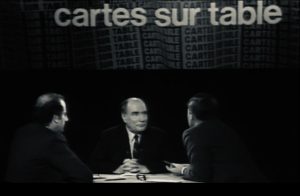
More than 40 years ago, on the 16th of March 1981, François Mitterrand was invited to a famous French political talk show called "Cartes sur table/Cards on the table", as its homonym novel signed by Agatha Christie. It was to be one of the last editions of the show hosted by Jean-Pierre Elkabbach and Alain Duhamel since 1977. The pre-electoral campaign for the French presidential elections was in full swing, with a first round scheduled on April 26, 1981.
For 64 year old Mitterrand, who previously lost two presidential elections (1965 and 1974), the upcoming election was almost certainly his last chance of becoming President. The polls were not very encouraging though: he was an underdog and acting President Giscard d'Estaing was the favourite.
The talk show went smoothly until the penultimate question, raised by Alain Duhamel: "There are currently 5 people sentenced to death and imprisoned in France. Will you pardon them (if elected)?"
This was a delicate question: it was about head of state prerogatives conflicting with the need for justice, and it was also about François Mitterrand's past, because as a young Justice Minister he did not oppose to executions of convicted criminals.
However, Mitterrand's answer was masterful: "As for the other issues, I will not hide my thoughts on this one. From the depth of my conscience, that rejoins that of the Churches - the Catholic and Reformed Churches, the Jewish religion and all the important humanitarian associations, I am against the death penalty. And I don't need to read the polls, that state the opposite: the majority of the opinions expressed is in favour of the death penalty.
Very well, I am candidate at the Presidency of the French Republic, and I request the majority of the votes of French people, but I do not request it through hiding my thoughts. I speak what I think, what I endorse, what I believe in, what my spiritual allegiances are, my belief, my caring about civilization. I am not in favour of death penalty".
François Mitterrand was often accused by the press and political competitors of being "a very secretive person". This statement made him look honest and true in front of the millions watching him. In his answer, he skilfully started by saying that "as for the other issues" he has nothing to hide on this one - a formula meant to dismiss the accusations of vagueness in many of his proposals and previous statements. He also underlined that his beliefs are those of the Catholics, Protestants and Jews of France, this way targeting a very wide basket of possible voters that traditionally were more conservative and less inclined to vote for a Socialist champion, such as Mr. Mitterrand. His powerful words were further strengthened by his look straight to the camera. François Mitterrand won his bet: French people saw that night a statesman who is ready to go against public opinion and possibly lose the presidential elections only to remain true to his beliefs.
Less than two months after this show, on May 10, 1981, Mitterrand was elected President of the French Republic. On September 18, 1981, the French National Assembly voted the draft law abolishing the death penalty, submitted by Mr. Mitterrand's government. The evening show statement became law.
Years after, Mitterrand confessed to his interviewer Alain Duhamel that his question helped him to be elected President.